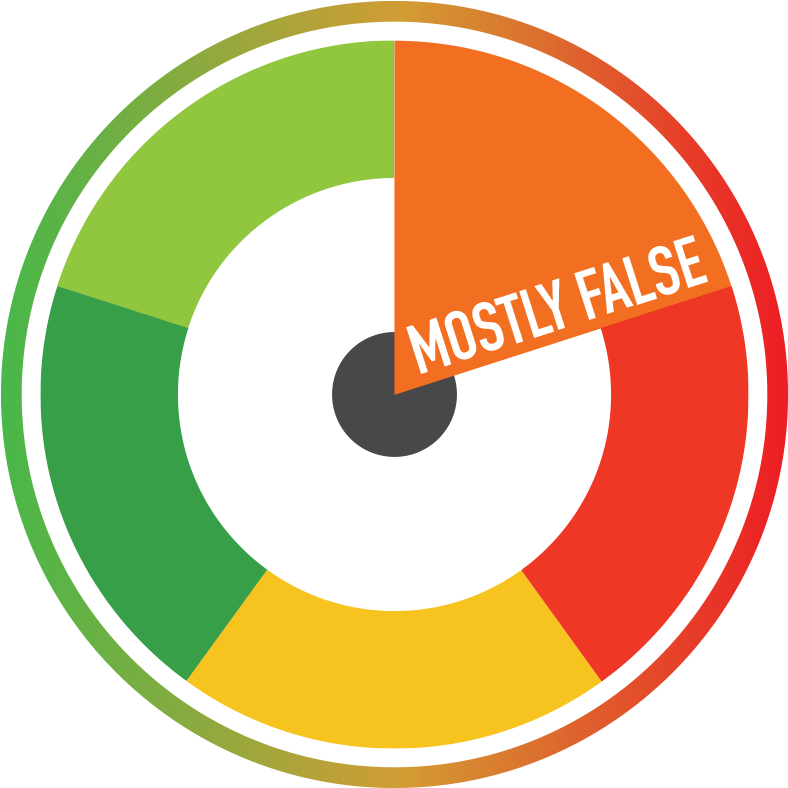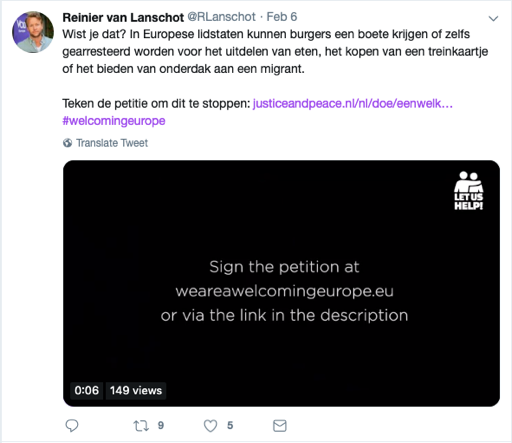Reinier van Lanschot, party leader of the new, pan-European party Volt – and probable new member of the European Parliament – claims on Twitter that migrant aid is punished in several European member states. Subsequently, he asks his followers to sign a European citizen initiative to make an end to this. However, punishment of migrant aid is not regulated by European law.
Van Lanschot tweets: “In European member states, citizens can be fined or even be arrested for handing out food, buying train tickets or offering shelter to migrants.” Then he asks his followers to sign a European citizen initiative “to make an end to this”, but it is not prescribed in European legislation how individual member states enforce their migration policy. Prof. dr. John Vervaele, professor of economical and European criminal law at Utrecht University, confirms: “There is indeed no international or European law that imposes criminalisation whatsoever.” According to the Oxford Dictionary, criminalisation means: “The action of turning an activity into a criminal offense by making it illegal.”
In 2002, the Council of the European Union did formulate a directive to restrict illegal immigration. Following the directive, all European member states must take suitable measures against people deliberately helping illegal immigrants to enter or travel within that member state. Also, all member states are expected to penalise people facilitating shelter for illegal immigrants, if they have the purpose to profit from it. The second article of the directive states that European member states may choose for themselves whether or not they will punish people who provide humanitarian aid to illegal immigrants.
“There are of course obligations that connect to human trafficking,” Vervaele explains. He adds that some states interpret these obligations in such a way, only just to spite NGO’s that are aiding migrants. According to a 2014-research by the European Union Agency for Fundamental Rights (FRA), facilitating shelter to illegal immigrants is penalised in all EU member states, excluding Ireland. 14 countries will only punish is when people profit from it. The other 13 punish facilitating shelter even when the person does not gain from it. In five of these member states dispensations from punishment are in place, included in their national legislation.
The petition that Van Lanschot refers to was written by Justice and Peace, a non-profit organisation devoted to human rights. According to the organisation the indistinct nature of the CEU-directive causes problems in practice. “It makes member states capable to keep threatening people. In this way, it works as a way to scare off people who want to help migrants,” a Justice and Peace spokesperson told EUfactcheck. The organisation takes into account the arrest of the mayor of the Italian Riace, just like several people offering aid to refugees in Greece.
What Reinier van Lanschot claims about punishing migrant aid in European member states is only partly true. Less than half of all member states actually penalise citizens for giving aid to illegal immigrants. Moreover, Van Lanschot is not being precise in referring to all migrants when it only applies to illegal immigrants.
What makes this claim mostly false however is the fact that he calls upon his followers to sign a petition addressed at the European Union to change it. But changing national legislation via a European citizen initiative is not possible. There is no European law that states that aid to illegal migrants should be penalised, so it is not possible to stop these practices at that level. Signing the European citizen initiative will thus not affect penalising or dispensing penalties for aid to illegal migrants. Based on this, we mark Reinier van Lanschot’s claim as: mostly false.
RESEARCH | ARTICLE © Charlie van Dijk, Utrecht University of Applied Sciences, NL






